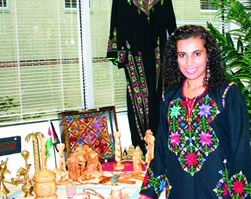Institute of World Cultures
By Debby Denehy
Although San Antonio has for-profit language schools and community cultural centers, there is only one institute designed to offer affordable, informal non-credit language and cultural education programs taught by international students for the community -- the Institute of World Cultures.

Rolla Alaydi ‘04 MEd creates a complete cultural experience for students in her embroidery classes.
The brainchild of Dr. Pat Watkins, UIW vice president for international programs, the Institute was born out of a desire to employ international students, who are prohibited from working outside the university, and to share their cultural experiences with UIW and the greater community. She felt these students had rich, unique experiences to share with others. “I kept thinking, wouldn't it be wonderful to invite people to tell others about their cultures,” says Watkins.
But how might this be accomplished? She proposed the objective to students in her doctoral class in Research in Entrepreneurship last fall and tasked them with researching and proposing what could be developed to fulfill this vision. She asked them to document their investigative work and recommendations in a formal business plan. The team, comprised of students from Korea, Japan, Taiwan, Palestine and the U.S., went to work, and by the end of the semester, they had it all mapped out. They even had a name.
Watkins was pleased with their efforts. “They researched the competition, gathered enrollment data, calculated costs, and considered the impact on student retention and possible obstacles to success,” remarked Watkins. “They even detailed how they'd evaluate the results. The report was a comprehensive business plan.”
And the concept they proposed fits exactly within the university's Mission of nurturing a diverse learning environment. Their invention is described as a hub for connecting different cultures through forums such as non-credit courses and cultural events offered for a modest fee. The plan explains the Institute as an arm of the Dr. Burton E. Grossman International Conference Center.
The Institute of World Cultures has the unique ability to recreate cultural environments by engaging international students in developing and leading programs about their own cultures. These resident experts in their fields, so to speak, can teach others about their lives. The business plan recommends holding casual forums to encourage two-way sharing of stories and experiences in a “cultural exchange,” enabling participants to get to know one another. And inviting the public serves to broaden the experience so more people can benefit.
As the Institute rolls out its first programs this year, look for opportunities to learn conversational languages and attend events such as an international folk fair. Watkins has formed a small team of students to meet regularly to continue planning and start implementing first events. Some ideas on the horizon include handcraft workshops and a textile exhibit. Other events will feature ethnic dancing, music, plants and food from around the world -- all organized and led by international students.
As a first step, the Institute recently piloted a workshop series offering lessons in embroidery of The Holy Land conducted by PhD candidate, Rolla Alaydi ‘04 MEd from Palestine. Alaydi, who studies International Education and Entrepreneurship, shared her art while recreating the experience of women of her culture complete with décor, tea, aromas, music, and typical one-on-one conversation. “We enjoyed spending time learning together and getting to know one another,” says Alaydi. “For me, it felt so comfortable, and I was thankful for the opportunity to connect with others this way.”
“That's what it's all about,” says Watkins. “Sharing and engaging one another so we can appreciate other's experiences and perspectives. By bringing different cultures into focus in a pronounced way, we can facilitate better understanding, reminding us we're all part of the same community.”
